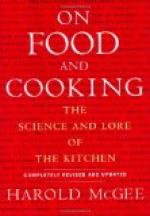DIET OF TRAINERS.—The
following are a few of the restrictions and
rules laid down by experienced
trainers:—
Little salt. No course
vegetables. No pork or veal. Two meals a
day;
breakfast at eight and dinner
at two. No fat meat is allowed, no
butter or cheese, pies or
pastry.
VEGETABLES
Vegetables used for culinary purposes comprise roots and tubers, as potatoes, turnips, etc.; shoots and stems, as asparagus and sea-kale; leaves and inflorescence, as spinach and cabbage; immature seeds, grains, and seed receptacles, as green peas, corn, and string-beans; and a few of the fruity products, as the tomato and the squash. Of these the tubers rank the highest in nutritive value.
Vegetables are by no means the most nutritious diet, as water enters largely into their composition; but food to supply perfectly the needs of the vital economy, must contain water and indigestible as well as nutritive elements. Thus they are dietetically of great value, since they furnish a large quantity of organic fluids. Vegetables are rich in mineral elements, and are also of service in giving bulk to food. An exclusive diet of vegetables, however, would give too great bulk, and at the same time fail to supply the proper amount of food elements. To furnish the requisite amount of nitrogenous material for one day, if potatoes alone were depended upon as food, a person would need to consume about nine pounds; of turnips, sixteen pounds; of parsnips, eighteen pounds; of cabbage, twenty-two pounds. Hence it is wise to use them in combination with other articles of diet—grains, whole-wheat bread, etc.—that supplement the qualities lacking in the vegetables.
TO SELECT VEGETABLES.—All roots and tubers should be plump, free from decay, bruises, and disease, and with fresh, unshriveled skins. They are good from the time of maturing until they begin to germinate. Sprouted vegetables are unfit for food. Potato sprouts contain a poison allied to belladonna. All vegetables beginning to decay are unfit for food.
Green vegetables to be wholesome should be freshly gathered, crisp, and juicy; those which have lain long in the market are very questionable food. In Paris, a law forbids a market-man to offer for sale any green vegetable kept more than one day. The use of stale vegetables is known to have been the cause of serious illness.




